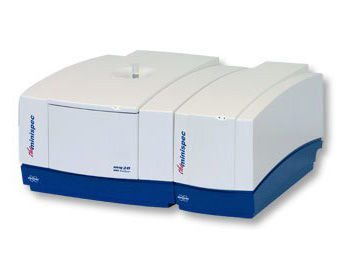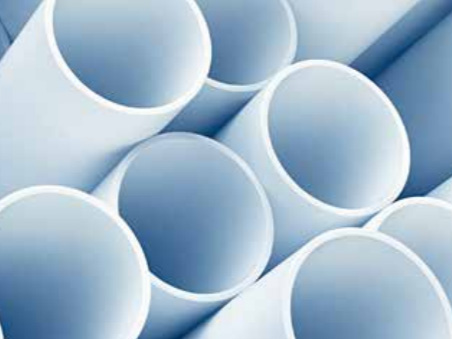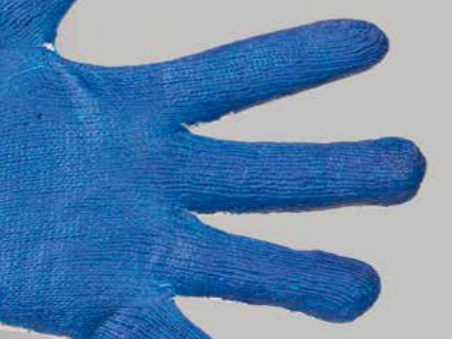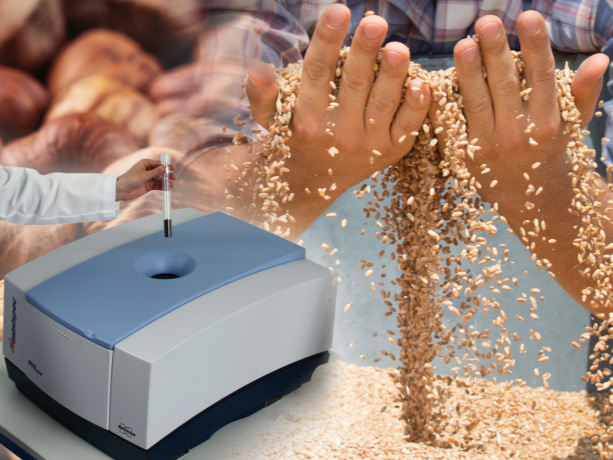Advance Analytical
เครื่องมือวิเคราะห์ทางวิทยาศาสตร์ขั้นสูง Advance Analytical
Advance Analytical
Hits: 3070
the minispec mq series TD-NMR Analyzers

Versatile Time-Domain NMR Analyzer from the NMR Experts.
- Relaxation and diffusion analysis
- Rapid, non-destructive, solvent free technology
- No sample preparation
- Replaces wet chemical and physical tests
- Simple linear calibration with 3 or more samples
- Chemometric calibration option
- 21 CFR part 11, IQ/OQ/PQ and GLP compliance
- Low maintenance Sample temperature range from -100°C to +200°C for unique R&D applications
- Fully developed magnet design for utmost speed of analysis
TD-NMR General Principles
TD-NMR uses a permanent magnetic field and radio frequency (RF) energy to look at NMR sensitive nuclei such as hydrogen and fluorine. In response, RF signals are generated by the sensitive nuclei and the signals are detected by the minispec. The amplitude and duration of these signals are related to the properties of the sample.
Unlike other spectroscopic techniques, TD-NMR is unaffected by sample color and surface properties. The minispec is perfectly suited to both QA/QC labs and R&D facilities because it is a nondestructive and non-invasive measurement that requires no sample preparation.
Unlike other spectroscopic techniques, TD-NMR is unaffected by sample color and surface properties. The minispec is perfectly suited to both QA/QC labs and R&D facilities because it is a nondestructive and non-invasive measurement that requires no sample preparation.
the minispec International Standard Methods
There are several published and well established methods for the minispec, including a number of international standard methods. In the food industry, Solid Fat Content (SFC) measurements are described in official methods by several organizations, including ISO, IUPAC and AOCS. In agriculture, oil and moisture in oilseeds and residues is determined by international standard methods. In the petrochemical industry, percent hydrogen in hydrocarbons like jet fuel and diesel are the subject of ASTM methods.
Food Industry
- Solid Fat Content in fat compositions (AOCS Cd 16b-93, ISO 8292 & IUPAC 2.150 methods)
- Oil and moisture in seeds and oilseed residues (AOCS Ak4-95, ISO 10565 & 10632 methods, USDA GIPSA approved)
- Solid Fat Content as well as total fat content in chocolate and chocolate related products
- Droplet size analysis in O/W and W/O emulsions Oil, water and protein in dry and wet food and feed
Textile Industry
- Spin Finish on Fibres (OPU)
- Coatings on Polymers
Polymer Industry
- Xylene soluble content in polypropylene
- Density and crystallinity in polyethylene
- Rubber content in polymers like ABS or polystyrene
- Cross-link density of elastomers
Petrochemical Industry
- Hydrogen content in hydrocarbons (ASTM D 7171 method)
- Oil content in paraffin and wax
Pharmaceutical Industry
- Fat and lean in live mice and rats
- Contactless weight determination
- Moisture and solvents in powders and tablets
- Contrast agent investigations near MRI fields: 0.25 T, 0.5 T, 0.75 T, 1.0 T and 1.5 T
Healthcare Industry
- Fluorine content in toothpaste
- Melting properties of cosmetics
R&D and Academics
- All types of temperature dependent relaxation time studies
- Diffusion experiments
- Single-Sided NMR
Typical minispec Configurations
- mq60: 1.41 T / 60 MHz
- mq40: 0.94 T / 40 MHz
- mq20: 0.47 T / 20 MHz
- mq10: 0.23 T / 10 MHz
- mq7.5: 0.17 T / 7.5 MHz

Solid Fat Content (SFC) Analysis
Solid Fat Content (SFC) determination is of prime importance for food processing and development. Raw materials like fat compositions or blends need to be characterized and controlled according to their
melting profiles.

Xylene Soluble Content in Polypropylene
The term ‘Xylene Solubles’ refers to the percentage of soluble species in homo- and copolymers of polypropylene. Its value correlates to the R21 value and to the amorphous content of the polymer.

Crystallinity & Density of Polyethylene
The crystallinity of polyethylene (PE) determines the stiffness, the impact and tensile strength, the permeability and the resistance of the material.

Spin Finish on Fibers Oil Pick Up with Sample Weighing
Spin Finish is added to fibers to improve their downstream handling in the process of manufacturing.

Textile Check for Spin Finish Removal
The minispec is able to detect Spin Finish down to very low concentrations. Thus, it is the method of choice to monitor the washing of Spin Finish on fibers and control the absence of Spin Finish.

Dip on Fibers Elastomer Coating on Fibers
For special fiber applications, an elastomer coating, so-called dip, is necessary to improve the fiber’s properties such as wind stopping, water repellent, and reinforcement.

Food & Feed Industry Fast and Reliable Quality Control by Time Domain NMR
To determine the essential properties of food and feed, Bruker developed a powerful device for fast
and reliable answers throughout all production and processing steps: the minispec based on Time
Domain (TD)-NMR.

the minispec QC and R&D in the Chocolate Field
For many years the Bruker minispec has been well-known in the Fat and Chocolate industries for a precise and reliable determination of fat melting profiles on basis of the Solid Fat Content (SFC) Determination.

Droplet Size Distribution in Food Emulsions
The droplet size distribution in these emulsions influences their taste, smell, and appearance, as well as their shelf life and spread behavior.

Oil & Moisture in Seeds and Nuts
The minispec benchtop Time Domain NMR (TD-NMR) analyzer is a proven performer for measurement of oil and moisture in oilseeds, residues and nuts.

Fluorine in toothpaste
With Time Domain Nuclear Magnetic Resonance (TD-NMR), the fluorine content can be accurately
measured irrespective of the fluorine compound and the toothpaste matrix.

Hydrogen Content in Hydrocarbons
TD-NMR analysis of hydrogen content in hydrocarbons, like diesel or jet fuel.
Contact us
Syntech Innovation Co., Ltd.
388/5 Nuanchan Road, Nuanchan,
Buengkum, Bangkok 10230
388/5 Nuanchan Road, Nuanchan,
Buengkum, Bangkok 10230
0 2363 8585 (auto)
0 2363 8595
081 498 9939

3089213
Today
Yesterday
This Month
All days
171
1549
28921
3089213
Your IP: 216.73.216.80
2026-02-17 02:26





